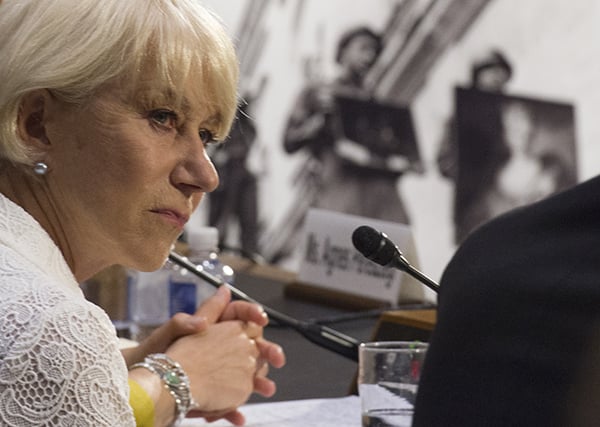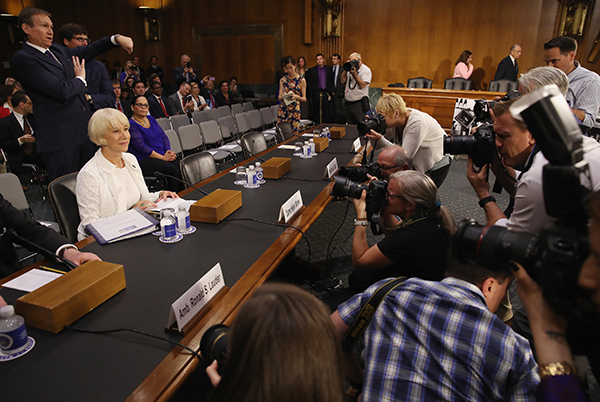Law & Politics
Helen Mirren Plays New Role in Push for Nazi-Looted Art Legislation
The actress is a champion of restitution efforts.

The actress is a champion of restitution efforts.

Sarah Cascone

As anyone who watched Helen Mirren in the film Woman in Gold knows, restitution of Nazi-looted art is not an easy process. In the 2015 film, the British actress played Maria Altmann, who is attempting to get back a famous portrait of her aunt, Gustav Klimt‘s subject Adele Bloch-Bauer. Now, Mirren is playing a new role: championing a new bill that would make the process of reclaiming looted artwork during World War II easier.
Related: Ronald Lauder Hires Washington Lobbyists to Hunt Down Nazi-Looted Art
The British actress was at Capitol Hill on June 7 for a Senate judiciary subcommittee hearing considering the proposed legislation, the Holocaust Expropriated Art Recovery Act. “Art restitution is about preserving the fundamental human condition,” Mirren said at the hearing, according to the New York Times. “It gives Jewish people—and other victims of the Nazi terror—the opportunity to reclaim their history, their culture, their memories and, most importantly, their families.”
The actress’s outspoken support of restitution efforts follows similar remarks she made at the 65th Berlinale International Film Festival in Berlin in 2015.

Actress Helen Mirren at the Constitution Subcommittee and the Oversight, Agency Action, Federal Rights and Federal Courts Subcommittee joint hearing on the “Holocaust Expropriated Art Recovery Act: Reuniting Victims with Their Lost Heritage.” on Capitol Hill on June 7, 2016, in Washington, DC. Courtesy photographer Mark Wilson/Getty Images.
New York senator Charles E. Schumer, who is co-sponsoring the bill, reminded the subcommittee that “it is our moral duty to help those survivors and their families achieve what justice can be found.”
The bipartisan bill is also sponsored by Connecticut senator Richard Blumenthal, Texas senator John Cornyn, and former presidential candidate Ted Cruz. One of its primary provisions would be to extend the statue of limitations, giving families six years to begin pursuing the return of artwork once they learn of its whereabouts.
Nearly 50 countries pledged to support restitution efforts in cases of Nazi-looted art by signing the Washington Principles in 1998 and the Terezin Declaration in 2009. A 2014 report from the World Jewish Restitution Organization, however, advises most countries, including the US, to do more to support the cause.

Actress Helen Mirren at the Constitution Subcommittee and the Oversight, Agency Action, Federal Rights and Federal Courts Subcommittee joint hearing on the “Holocaust Expropriated Art Recovery Act: Reuniting Victims with Their Lost Heritage.” on Capitol Hill on June 7, 2016, in Washington, DC. Courtesy photographer Mark Wilson/Getty Images.
Ongoing restitution claims include an Amedeo Modigliani canvas tied up in the Panama Papers revelations through a shell corporation owned by the Nahmad family. Recently, the University of Oklahoma (OU) agreed to return a Camille Pissarro painting to a French Holocaust survivor. Many paintings seized by the Nazis still remain in museums and private collections.
“I wish this legislation had happened 10 or 20 years ago, but the fact is that it’s happened, it’s going to have a major effect on the future,” World Jewish Congress president Ronald S. Lauder told the assembled senators. “And many works of art—I use the expression ‘the final prisoners of World War II’—will finally find their rightful owners.”
According to Cruz, the bill will allow courts to examine restitution cases based on the facts, rather than getting mired in technicalities “that often work to the disadvantage of Holocaust victims and their families.”